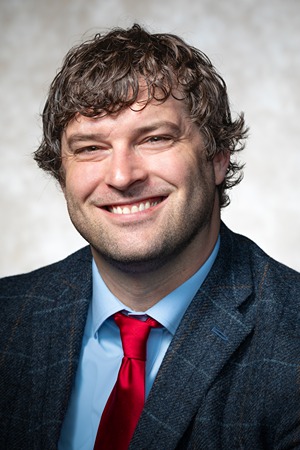Trey Malone named as Boehlje Chair in Managerial Economics for Agribusiness
“A business newspaper published an interview with me a few years ago titled, ‘Ag economist: U.S. isn’t going to run out of food soon,’” Trey Malone said. “It’s framed.”
The agrifood economist explained that this story focused on his “new school approach” to applied economics. Called “convergence research,” his academic goal is to break down systemic topics, like the impact of the COVID-19 pandemic on the global food system, into digestible information for various audiences.
 As the Purdue University College of Agriculture department of agricultural economics’ Boehlje Chair in Managerial Economics for Agribusiness, Malone intends to make purposeful connections with the campus community, agribusiness and agtech industries, and smaller farm operations.
As the Purdue University College of Agriculture department of agricultural economics’ Boehlje Chair in Managerial Economics for Agribusiness, Malone intends to make purposeful connections with the campus community, agribusiness and agtech industries, and smaller farm operations.
These types of operations are familiar to Malone. “My family had a ranch in Laverne, Oklahoma, but it wasn’t profitable. I’m most excited to come up with creative ways to increase farm profitability for smaller operations, especially for producers in middle America,” he said.
He’s also driven by the desire to innovate research-based solutions for the agrifood industry. Malone’s upbringing guided his interest in food systems and entrepreneurship, but Michael Boehlje inspired him to pursue agricultural economics. He first heard Boehlje, the now-retired distinguished professor of agricultural economics at Purdue, speak to a group of rural bankers when Malone was a graduate student at Oklahoma State University nearly a decade ago.
“I was blown away at how Dr. Boehlje talked about finance strategy for world banks and the way he could break down global issues,” he said. “I remember leaving the conference thinking, ‘This is what I want to do.’”
Boehlje now views Malone as a pioneer in the field. “I think he is a good fit for the chair as we’ve defined it. He has a strong focus on all three dimensions of the land-grant mission, in teaching, research and engagement/extension,” said Boehlje, who, with his wife, Rita, committed to funding the chair in 2022.
“I am confident that Trey will make significant contributions in research, the classroom and outreach/engagement activities of the Center for Food and Agricultural Business and the Center for Commercial Agriculture. He works very hard to see that his research results are disseminated to the appropriate audiences,” Boehlje said.
Malone is honored by the chance to carry on Boehlje’s legacy. “This position is humbling. It’s my dream job. Dr. Boehlje is hypertalented, and I have big shoes to fill,” he said.
Malone has garnered extensive recognition in his field, winning more than a dozen awards during his career. Last year, he was the agricultural economics fellow for sustainable food systems for the Farm Foundation. He was previously an associate professor at the University of Arkansas and an assistant professor and Extension economist at Michigan State University. He has contributed to over 60 research articles and been featured in news outlets such as The New York Times, CNN and Time magazine.
His research focuses on entrepreneurship, public policy impacts on the agrifood supply chains and behavioral economics. As the Boehlje Chair, he wants to harness the power of Purdue’s land-grant mission and other College of Agriculture centers. “The College of Agriculture is innovative. It will give you the tools to knock down walls,” Malone said. “I think the college is in lockstep with Purdue’s legacy of innovation.”






